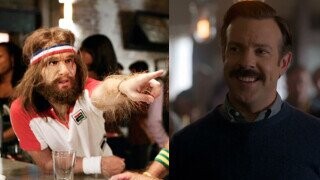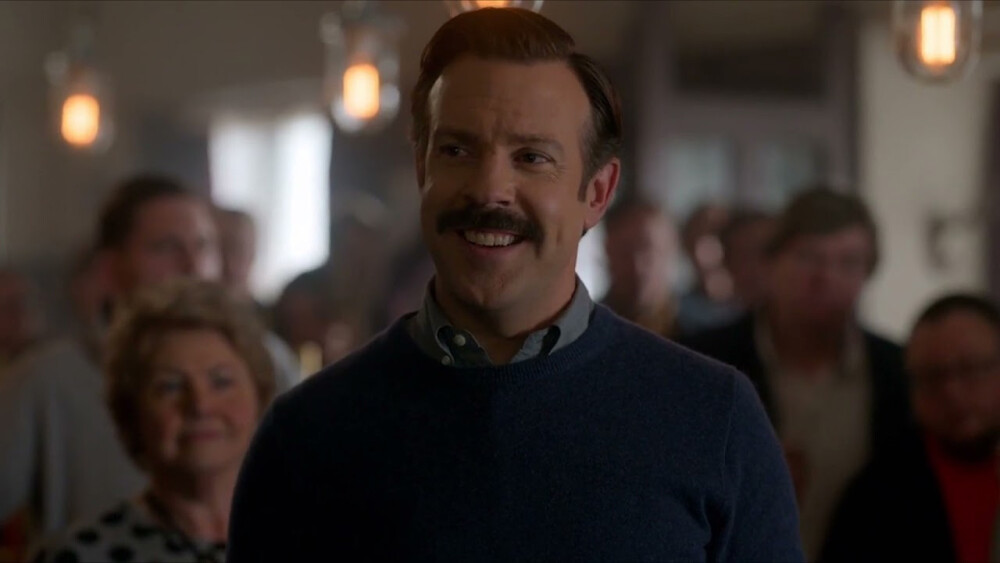Before 'Ted Lasso,' There Was 'Cavemen': A Dual History Of Commercials-Turned-Sitcoms

Welcome to ComedyNerd, Cracked's daily comedy Superstation. For more ComedyNerd content, and ongoing coverage of that late 80's commercial-turned-comedy, The Iran/Contra Affair, please sign up for the ComedyNerd newsletter below.
It sure felt like Ted Lasso came out of nowhere. The Jason Sudeikis comedy with a lot of heart and even more folksy epithets hit Apple TV in August 2020, right as the reality of the new COVID-world settled in, and we were all collectively in need of a long hug and a box of shortbread.
Don't Miss
But what some Lasso Believers may not know is that Coach Lasso and Coach Beard had been waiting in the wings for seven long years before finally finding the hearts and minds of a world desperate for a jolt of optimism.
The characters were created for an advertising campaign in 2013 when NBC spent a whopping $250 million to acquire the rights to broadcast Premier League Soccer. Jason Sudeikis had just left the cast of Saturday Night Live, and after ten years at 30 Rockefeller Plaza, NBC wasn’t going to let his rising star out of their orbit just yet.
NBC recruited Sudeikis and Brendan Hunt to play American Football coaches dropped into the world of a Premier League club, hoping that the duo could finally trick Americans into watching soccer.
2013 Ted Lasso was a little less happy go lucky and a little more awkward and lonely
Ted Lasso’s journey from commercial to serialization is not the first of its kind. Lasso’s story might have a happy ending, but the fate of a similar commercial-turned-comedy who preceded him was much different.
The colossal success of Ted Lasso can only be fully appreciated when compared to the equally colossal failure of Cavemen, the infamous GEICO commercial adaptation starring Nick Kroll. Cavemen is Lasso’s inverse, its opposite, the yang to Lasso’s yin.
Why did Ted Lasso succeed where Cavemen failed? The answer is surprisingly simple—one show did the work in building the elements of a meaningful narrative, while the other pushed its one joke to the most vulgar, tone-deaf, and uncomfortably racial extremes.
What a funny commercial. This definitely has the legs for a sitcom about race politics.
It Started Out Fine
A commercial that elicits a genuine laugh is a rare thing. Companies are in constant competition to break through the glazed-over detachment of a consumer that sees between 4,000 and 10,000 ads every day and create a lasting, positive impression. And in the wry, sardonic, post-Seinfeld era, the GEICO Cavemen were a hit.
Campaign creator and television writer Joe Lawson was inspired by George Saunders’ short story “Pastoralia” to write an insurance commercial about cavemen living in the modern world, facing the same early 2000’s listlessness and crisis of identity that their Homo-sapien counterparts faced. The ads featuring dis-grunt-led Cro-magnons employed a dry, deadpan delivery that left audiences wanting more. And more. Aaaaand more.
They basically filmed a whole pilot in 30 second chunks
Beginning in 2004, GEICO ran 22 unique commercials featuring the cavemen. Each iteration was more elaborate than the last, featuring celebrity cameos and escalating production values.
When a company strikes commercial gold, their only recourse is to mine the vein dry. And in this case, that meant bringing Cavemen as a situation comedy to Tuesday nights on ABC.
“Gold” is not a good description of what happened next.
And Then It Became An Abomination
When ABC first announced that they were turning the prolific ad campaign into a sitcom, they marketed the show as a "unique buddy comedy that offers a clever twist on stereotypes and turns race relations on its head."
If you're thinking “My God, how awful,” you're not alone in that thought - but it was nowhere to be found at ABC.
Joe Lawson, a white dude, convinced his producers, all white dudes, to make a TV series starring white dudes cloaked in Cro-magnon makeup & prosthetics whose lives are presented as analogous to the African-American experience.
The lead, Joel (played by Bill English) is an IKEA furniture salesman who shares a condo in San Diego with his best friend Nick (Nick Kroll), a sarcastic, lazy, permanent post-grad student and Caveman activist, as well as Andy (Sam Huntington), Joel’s upbeat but naive younger brother.
The three are Cro-magnons living in a Homo-sapien dominated society, and they deal with the obstacles of being a racial minority in ways that only white dudes writing minority characters can imagine.
The pilot, which was criticized as being racist, featured the three Cavemen roommates bemoaning the portrayal of Cro-magnons in the media as being violent criminals before crashing a party at a country club that exclusively caters towards Homo sapiens, with Cavemen allowed in only as groundskeepers or waiters.
If you could stomach the unaired pilot which tragically survived the ravages of time, I’m sorry you had to see that.
Lawson and ABC reworked the first episode, recast one of the leads and aired a more light-hearted, self-aware series premier which instead featured Nick Kroll’s character arguing with his roommates for half an hour about the ethics of race mixing.
From there, the show steps directly into an elevator shaft on its quest to solve racism through thinly veiled “satire." Cavemen was cancelled after only seven episodes, but the full season is available online. Since I watched the entire series, let me give you a quick play-by-play of all the issues tackled in each episode so that no one ever has to watch it again:
Episode 1: Race mixing.
Episode 2: Racial profiling, workplace discrimination.
Episode 3: Race mixing again, plus a timely takedown of the frozen yogurt fad.
Episode 4: Racist mascots.
Episode 5: Race traitors, or “shavers” (Cavemen who shave their excess hair to pass as Homo-sapien.)
Episode 6: Racial bloc voting, or Cavemen exclusively voting for Cro-magnon candidates. The Cavemen change their mind when they realize that their candidate’s entire platform is being “anti-gluten.”
Episode 7: Workplace discrimination again, plus the introduction of guest star Stephanie Courtney, a.k.a. Flo from Progressive (what is this, an insurance crossover episode?)
Episode 8: The only episode without blatant racial themes. Instead, Nick Kroll navigates the difficulties of being uninsured with appendicitis.
Episode 9: Preserving cultural heritage, also introducing guest star French Stewart as a sad, workaholic middle-manager and the lone highlight of the season.
Episode 10: Racial caricatures in stand-up comedy. Think Dave Chappelle and the “wrong kind of laugh," but explained by a bunch of white guys at an open mic.
Episode 11: Mixed-race adoptions, the most uncomfortable episode in the series.
Episode 12: Gender roles within ethnic groups, i.e. Hunters vs. Gatherers.
The show was a critical and commercial failure and consistently appears on lists of the worst TV shows of all time.
In fact, it was such a disaster that not only did GEICO disavow the series entirely, but they put out a commercial DURING THE SUPERBOWL distancing themselves from the monstrosity.
That’s like your parents taking out an ad in the New York Times saying they wish they'd known about abortion.
The Lesson Of Lasso
After the Hindenburg-esque flameout of Cavemen, Ted Lasso managed to make the jump from commercial to sitcom. So why is Ted Lasso so good while Cavemen was so bad?
It couldn’t be due to a talent disparity—Nick Kroll clearly knows how to make a hit comedy (the new season of Big Mouth has a Cavemen Easter egg). Joe Lawson had a successful career post-Cavemen as well; he went on to write and produce for Modern Family, and he wrote many episodes of BoJack Horseman, for which he received a Writer’s Guild of America award.
No, the stark difference between Ted Lasso and Cavemen lies in their approaches to proceeding from a premise that was only meant to last a couple minutes—the Ted Lasso creators took a novelty, an American football coach managing a Premier League team, and built out his heart and depth to the point where Ted was more than just the folksy fish-out-of-water. He was a human being with thoughts, feelings, passion, and flaws.

Apple
Cavemen just took an insurance commercial and turned it into twelve episodes of barely-disguised blackface.
The first season of Ted Lasso could very well be a metaphor for the adaptation process itself: Ted starts as a gag, a joke being played on the fans, but because of his earnestness, those who doubted him come to see him for who he really is—a thoughtful, genuine, and delightful force of nature who brings out the very best in us.
Let's just say Cavemen brings out … something else.
Top image: ABC/Apple TV
